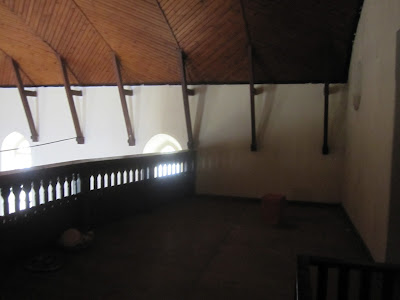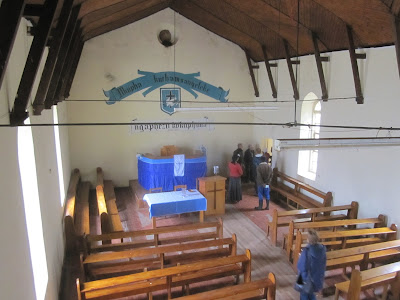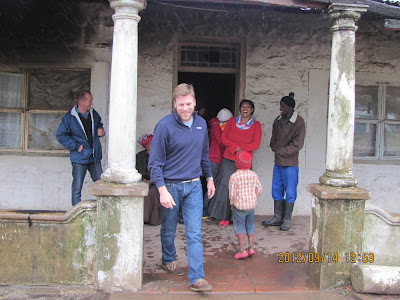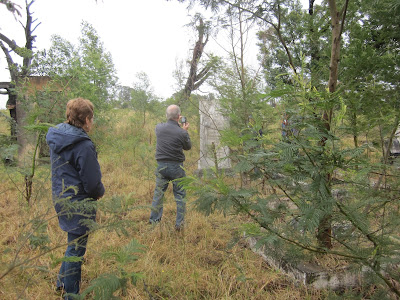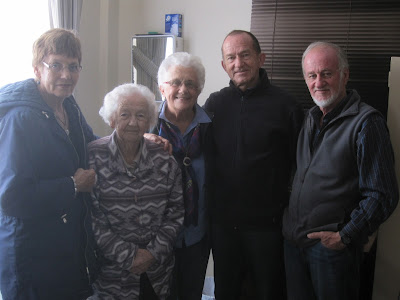After a wonderful week of
holiday, this week started "teaching experience" (TE) in which my
students go out and student teach in the community. During this time, I am
allocated students to go observe, coach, and liaise with the school community.
This opportunity is a "breath of fresh air" in many ways, but
importantly, it helps students to practice their skills and learn first-hand.
Although I think the experience should be longer than three weeks (six weeks
total, over the year), it is still meaningful. I also appreciate the
opportunity to visit a variety of different schools in different neighborhoods
across Johannesburg, giving me greater insight into the educational atmosphere of
South Africa (or at least Johannesburg).
On Tuesday evening, I
picked up Rob and Mariann and we went to Fordsburg, a large Indian and
Pakistani neighborhood to have dinner with Ryan and Micah, who are both leaving
Johannesburg (Ryan is a Fulbrighter going back to the US, Micah is a South
African going to school at Oxford). It was nice to have a final dinner together
and say our "goodbyes." The food was great too; I've never had
specifically southern India cuisine (e.g. dosa). My social network is quickly
shrinking in proportion to my time left in South Africa.
This weekend I had the
extraordinary opportunity to go to Frankfort and Braunschweig, two neighboring
villages in the Ciskei where my Grandmother and her family settled in 1927. The
trip originated when Giulia and I were staying with dear family friends,
Raymond and Sylvia Weiss. We talked about our families and their histories… and
we organized a trip to Frankfort and Braunschweig (I didn't do much
"organizing", aside from booking a flight!). I flew into Port
Elizabeth on Thursday evening and stayed over at Raymond and Sylvia's before we
took off early the next morning. Our families are uniquely connected, as
Raymond and Sylvia were members of my Great-Grandfather's congregation, were
confirmed and married by him as well. When my Great Grandfather and Grandmother
retired in Port Elizabeth, they helped them immensely and spent time with them
often. Moreover, Raymond's aunt's uncle (by marriage - if that makes sense),
Carl Kashagen, raised Helmut on his farm when his two brothers were sent to the
Southwest (Namibia) and his father (my great-grandfather) was interned at
Baviaanspoort.
We left on Friday
morning, with Raymond's brother, Dudley, and his wife, Cynthia joining us on
our journey back to Frankfort. Both couples hadn't been back to Frankfort for
over 40 years and were anxious to see what their childhood homes and the community
looked like. In the 1970s, as the older generation neared retirement they sold
their land to government (originally given to them by the Berlin Commission, to
encourage Germans to move to South Africa). Since then, the land has been
redistributed and is an extremely poor area, with little (no) industry. In any
event, we packed and headed toward Grahamstown, our first stop. Grahamstown is
a small "city" (because it has a cathedral) northeast of Port
Elizabeth, home to Rhodes University and rich English heritage. We stopped at
the 1820 Settler's monument and had breakfast. Continuing on, we drove through
Peddie and then headed toward King William's Town. Before arriving in King
William's Town, we stopped in Gwaba (ge-wah-ba), a small village where
Raymond's parents had a trading store from 1948-1976. Ray and Sylvia have since
become good friends with the new owners, who welcomed us in for tea and
biscuits. After a nice visit, we continued onward to King William's Town. King
William's Town is the nearest "city" to Braunschweig and Frankfort -
a city where Raymond and Dudley went to secondary school and at a period,
Raymond's parents, Raymond, and Dudley lived. We found their parents' home,
drove through the city, and went to Braunschweig.
 |
| Grahamstown |
 |
| 1820 Settlers Monument |
 |
| Breakfast in Grahamstown! |
 |
| Me and Dudley (Ray's brother) |
 |
| Road Stop |
 |
| Ray's Parent's Trading Store from 1948 - 1976 (Qwaba) |
 |
| Current owners of the trading store |



Braunschweig is off of
the main road outside of King William's Town and we trudged along the dirt
(mud) road toward the Braunschweig steeple (you can see it from the main road).
I had only seen pictures of Braunschweig, an immaculate church with a powerful
white steeple. My Great-Grandfather had a vision of the alter in the Braunschweig
church when he was injured during the Battle of Verdan in World War I. We drove
up toward the church and saw schoolchildren running around outside the church
and the surrounding buildings, which housed a school (they weren't on recess -
we were told the teacher's don't teach on Friday). What I saw was upsetting;
the paint was peeling off of the church, windows were broken, the door was
swung open … it was overall really dilapidated. Honestly, it was emotional for
me and it doesn't even have the connection that it had to Raymond and Sylvia
(they were married there). The church was fenced in along with the school
buildings, but the church seems to be abandoned. We drove up the hill further
and spoke to a woman on the road (Raymond and Sylvia are fluent in isiXhosa),
who explained that they used to clean the cemetery and take care of the church,
but they were no longer paid (by the government). She was selling homemade beer
and told us about the lack of work in the area. The rain started and we headed
back toward the main road, unable to get to the cemetery, which from a distance
looked overgrown and dilapidated. The weather was fitting for the tone of the
visit, misty and grey…

 |
| Entering Braunschweig |
 |
| Church and school |
 |
| Buffalo River |
 |
|

From Braunschweig, we
went out onto the main road and took the next turnoff for Frankfort. We drove
through a township and arrived in Frankfort, with images of pictures I've seen
throughout the years flashing back in my mind (yes, it did look familiar!). We
passed the Frankfort Dam (on our left) and headed toward the Frankfort church.
We turned left off of the main street and stopped at my Grandmother's home (the
"mance" - pastor's home). Remarkably, the home was still standing,
occupied by a large family. Raymond introduced himself - I'm sure his speaking
of Xhosa and his warm personality helped "breaking the ice". At
first, the "gogo" (grandmother) of the family did not want to show us
the church, saying that the person with the key was away. As Raymond explained
his story and introduced me (an American who came to see where my Grandmother
grew up), the family warmed up to us. We went around the house and they
unlocked the church. The church is used by a local congregation and in much
better shape (relatively) to the Braunschweig church. We walked around the
church, took pictures, and soaked in the atmosphere (for Raymond and Sylvia,
the memories).
After promising to return
before we left the city, I walked out toward the German monument, which is in a
field a few hundred meters from the entrance of the church. The monument was
built in 1910 - and even includes one of Sylvia's relatives (Buss) as the town
"overseer" (for a lack of better words). We continued in the same
direction from the monument toward Raymond's grandparent's home, which was
also, remarkably standing. The home was immaculate, compared to the surrounding
buildings/location. The lawn was manicured and there was a small garden. Ray
introduced himself to the owner, who explained that he took control of the home
and fixed it up. Supposedly, when the farms were sold to the government and
redistributed, people would take the homes apart for supplies (a zinc roof or
bricks, for example). They did this rather than just move into the home for
fear that they would be "kicked out" of the home if they were to move
in (since it wasn't properly theirs). The current owner bought the property and
fixed it up, retiring in the rolling hills of Frankfort (he had the only car I
saw in town). This was very meaningful, especially for Ray, who grew up for a
time period with his Grandparents (and Gertrude Kashagen - a classmate of my
Grandmother) while his parents were farming in the Transkei.
We drove back to my
Grandmother's house, spent time talking to the family, and I was able to walk
into the home, which has seen little improvement/upkeep (I would imagine) since
my great-grandparents moved out in the 1970s (1976?). I walked up the main
hallway and they showed me the bedroom (the last on the right), my
Great-grandfather's old study, and the room across the hall (the kitchen, I
believe). Not to be cliché or corny, but I while I was walking down the
hallway, I could imagine going back to the 1920s, when it was "new"
and well kept (like the old woman in "Titanic"). We also walked
around the corner to the old school and confirmation building, where my Grandmother
went to school. It was in much better condition and was not occupied (the
buildings and the church were fenced in). Before saying goodbye to the family,
we gave them some money and, incredibly, a bag of oranges. The family is very,
very poor, living on sporadic jobs (they described as "doing laundry for
R20" - $2.75). What shocked me was how much oranges meant to them, they
don't get fresh fruit often, and oranges are a special treat (something that
I/we view as "no big deal"). When I handed the bag to the daughter of
the gogo, her face lit up and she was elated with the gift. Her son, jumped up
and down, grabbing the bag from his mother (it weighed more than he and if stood
on end, would be taller too). We took some pictures together and then continued
through the "main street" (an overstatement) of Frankfort. Many of
the buildings are still standing: the Bankenstein's blacksmith building, the
Post Office, the Principal's home, Mrs. Childs/Auntie Pine's home, and the
Frankfort hotel/bottle store. We drove down the street where Ray and Dudley
were born, in a home rented behind the post office (around that area). As we
drove down the main street, school let out (the new school is across the
street, around 100 meters from my Grandma's house) and there were hundreds of
kids in the street, all looking "smart" and trekking back home (a
really "rural" picture). We then drove down the hill to the cemetery.
What we saw was also disheartening; the grass was overgrown (an
understatement), headstones were pushed over, and a herd of goats were grazing
at the bottom of the cemetery. We walked through the broken gate and examined
the headstones for familiar surnames. Many of the surnames were familiar to me,
hearing Raymond talk about townspeople and prior, my Grandmother and Onkel Theo.
We found Sylvia's grandmother's headstone, pushed over. Dudley and I pulled the
headstone back, so that we could take a picture. We also found Carl
("Uncle Carl") Kashagen's headstone, the man who Helmut stayed with
while my great-grandfather was interned. After a meaningful and insightful
visit, we drove through a few of the surrounding townships, heading out of
Frankfort, toward East London.
 |
| Entering Frankfort |
 |
| Main Street |
 |
| Grandma's House (and Raymond) |
 |
| Looking out toward the German Monument |
 |
| Veranda of the house |
 |
| The grandson (presumably) of the owners |
 |
| Frankfort Church |
 |
| Raymond and gogo |
 |
| From German Monument looking back toward church/house |
 |
| German Monument (built 1910) |
 |
| Raymond's Grandparent's farm |
 |
| On the side of Grandma's house |
 |
| Old school/church building |
 |
| Veranda, with chickens! |
 |
| Oranges to the owners of Grandma's house |
 |
| Old Post Office |
 |
| Old hotel |
 |
| Mrs. Childs and Auntie Pine's house |
 |
| House that Ray's parents rented (he was born here) |
 |
| A happy face! |
 |
| School's out! |
 |
| Bankenstein's House (along main road) |
 |
| Cemetery entrance |
 |
| Relative of Sylvia (and former town manager - see 1910 monument) |
 |
| Goats grazing... in the cemetery |
 |
| "Uncle Carl" (relative of Ray's and person who Helmut stayed with) |
 |
| Sylvia's Grandmother |
 |
| Frankfort Dam |
 |
| Cynthia, Dudley, and Sylvia |
On our way to East London
for the night, we drove through Marienthel, Peelton, and Komga ("com-ka").
Thankfully, when the land was sold to the government, the furniture and
"church-wares", for a lack of better words, went to two churches in
the surrounding area. The church-wares from Braunschweig went to the
Evangelical Lutheran Church in Komga, which we passed, but it was locked. The
church-wares from Frankfort went to the Lutheran church in Beacon Bay, near
East London. We arrived at our accommodation in Gonubie, a suburb of East
London, had a short rest, and then went out to dinner, reflecting on the day.
There was so much to see, take in, and ask about… It was really meaningful to
have the chance to ask Ray and Sylvia my questions, clarify family trees, and
hear more about their experiences.
The next morning, we went
to see Sylvia's cousin, Iva Buss, who lives in Gonubie. We had tea and cake and
I enjoyed listening to Iva and Ray talk about Frankfort. Both men have a wealth
of knowledge and reminded each other of lost memories (there were many
"ah-ha" moments). From Iva's we drove into East London and stopped to
see Gertrude Kashagen ("Aunt Tootee"), Raymond and Dudley's aunt and
my Grandmother's classmate (she was born in November 1923). It was a very
special visit - meeting a resident of Frankfort in my "Grandmother's time"
(someone who knew my grandmother well, they "played together" my
Grandma said). From Gertrude's, we drove through East London (now "Buffalo
City") and along the coast back toward Port Elizabeth. We drove through
Port Alfred, a posh coastal town and then made our way to the holiday home that
Raymond and Sylvia (and family) rent. The coast between Port Elizabeth and East
London is stunning, the "Sunshine Coast". Ray showed me their rental
home on the ocean. There are massive sand dunes in front of the house, slowly
creeping toward the houses situated on the coast. With relentless wind, we
trekked up and down the dunes, sand finding its way into, well, everything (I
poured out a kilo from my shoes!). Before arriving in Port Elizabeth, we
stopped at a "country store" to pick up meat pies and fresh bread
rolls for dinner…and I settled my biltong addiction (dried meat, South African
style).

 |
| With Iva Buss |
 |
| Gertrude Kashagen (Ray's Aunt and my Grandma's classmate) |
 |
| Final Dinner (L-R): Sherene, Scott, Cynthia, Dudley, Sylvia |
It was a long, yet
meaningful journey. We did and saw so much in two days, taking advantage of
every moment. I am forever grateful to Raymond, Sylvia, Dudley and Cynthia for
giving me this opportunity; I would never have gone to Braunschweig/Frankfort
myself (I don’t speak the language, don't know where to go, et cetera). I
am/was so appreciative for their insight and sharing their history (and my
history) with me… a trip I will always cherish and remember.






























































